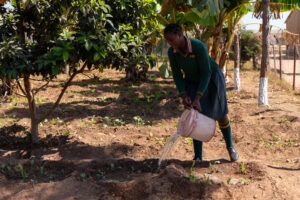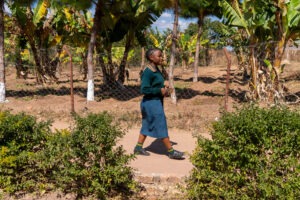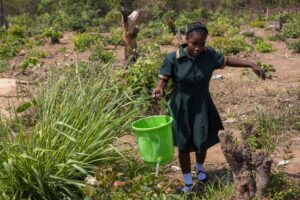For a third consecutive year, Zambia tops the list of the world’s most underreported crises[1]. Although it may not dominate your newsfeed, Zambia is grappling with its worst drought in over four decades. Rivers have run dry, hydropower has failed, and 21-hour power cuts are now a daily reality for millions. At PEAS, we see this crisis up close every day in the rural communities where we work. It is a stark reminder that the climate crisis is not just about rising temperatures and unpredictable weather patterns – it is about the loss of livelihoods and futures.
The daily reality of the climate crisis in Zambia
The ongoing drought, exacerbated by the global climate crisis and the El Niño weather phenomenon, has caused Lake Kariba to shrink in volume by 98%. As a result, hydropower – Zambia’s primary source of electricity – has failed, leaving people without power for over 21 hours a day. Power outages, food shortages, and water-borne diseases are on the rise. In October 2023, 21,000 cholera cases were reported. In February 2024, President Hakainde Hichilema declared the drought a national disaster and emergency. Half the country’s population have been affected, and 6.6 million need urgent support.
The government has taken several steps to respond to the impact of the drought on Zambia’s communities. These measures include providing cash-for-work programs, which offer temporary employment opportunities to help people earn an income while contributing to local infrastructure projects. The government has also released drought emergency funds and expanded cash transfers to the most affected households to help them meet their immediate needs. However, despite these efforts, the scale of the crisis means that most Zambians still require more support. Additional resources and collaborative efforts are needed to ensure that vulnerable communities have the support and resilience to withstand the ongoing and future impacts of climate change.
The impact on education
In Zambia, the climate crisis is visibly affecting students’ learning, and it’s getting worse. Schools across Zambia, including PEAS schools, are connected to the national grid and heavily rely on hydroelectric power. With 21+ hours a day of load shedding, schools have limited access to electricity and running water. Computer labs sit unused, day scholars have to be sent home early due to the lack of power and limited water supplies, and boarders are left without light to study in the evening.
The lack of power also means water pumps don’t function, leading to water shortages that impact students’ health and hygiene. Girls and women are disproportionately affected. They are more likely to be absent or drop out.
When crops fail, livelihoods are lost, and students go to work not school. All of this is hardest for our girls; during weather-related crises they are more likely to marry early, and in the drought, they drop out of school to take on more chores such as fetching water [2] [3]. The increased time and distance required to fetch water also exposes them to greater risk of violence and exploitation[4].
Our response: Building climate resilience schools and communities.
In the face of these challenges, PEAS is committed to empowering our students and communities to mitigate the risks and respond to the impacts of the climate crisis. At the heart of our response is a focus on sustainability and community-driven solutions.
We have installed solar panels at our schools to reduce dependence on the national grid. These panels provide enough electricity to light boarding house in the evening and pump water for daily use and irrigation. PEAS plans to upgrade our solar systems to increase their efficiency and capacity. This includes replacing costly lithium batteries to enable schools to store more power.
PEAS schools have well-established gardens which students tend to during their agricultural classes. These gardens enhance schools’ self-sufficiency by producing vegetables that supplement the school feeding programme. For example, at PEAS Kampinda Secondary school, students helped to produce of 180 bags of maize – enough to feed students and staff for an entire year. This initiative contributes to addressing immediate food needs and fostering an understanding of sustainable agricultural practices among students.
We work closely with local communities to share our knowledge and promote sustainable local practices, including rainwater harvesting and tree planting. PEAS students are actively engaged in climate initiatives, extending their work beyond school to pick up litter, plant trees, and educate their communities about local climate-smart practices. These activities help to build awareness and empower young people to be agents of change in their communities.
It’s not just our students who are affected – the entire PEAS Zambia team face similar challenges. Daily and extended power outages disrupt their work, making it difficult to charge laptops and phones, and access reliable internet. In response, we have installed solar panels to ensure our teams can continue working undisturbed.
The climate crisis is here, and its impact is being felt most acutely by rural communities in Zambia, and across Sub-Saharan Africa. There is no time to waste. We need to scale our work fast, and we are here to help others who want to learn more about what works.
If you want to learn more about our work, or support our climate-smart programming, please contact partnerships@peas.org.uk.
Written by Amosi Chipasi, School Network Senior Manager, PEAS Zambia
[1] Care (2024). Breaking the silence – the 10 most under-reported crises of 2023. Available here.
[2] Nalungwe, B. (2024). Drought’s impact on the community: A journey to Rufunsa to see the impact of the drought on the community. UNICEF. Available here.
[3] Kwauk, C. and Braga, A. (2017). Three platforms for girls’ education in climate strategies
[4] OCHA (2024). Zambia: Drought Flash Appeal. Available here.


